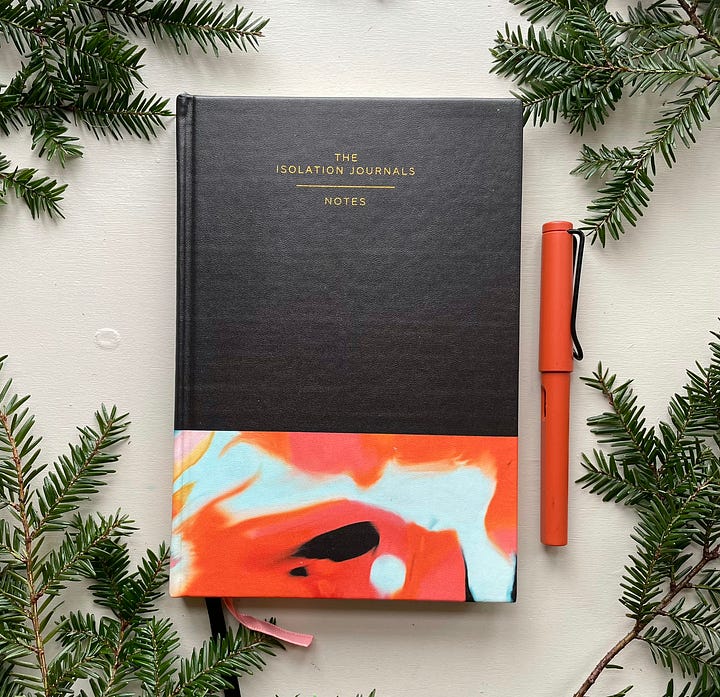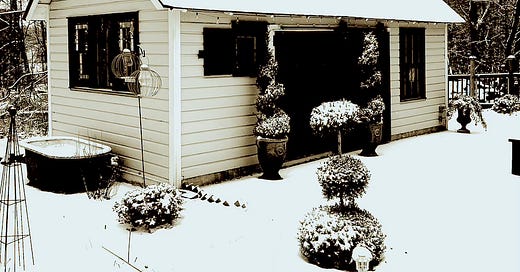Hi friend,
I’m writing to you from my writing cottage, which is currently flocked by the first real snow of the year. On some winter mornings, I plan ahead. I light a fire in the wood stove, take the dogs for a walk, and come back to a perfectly toasty warm nook. But today I didn’t, and inside and outside, the temperature is the same—about 20 degrees. I’m wearing two sweaters plus a coat, covered by a heated blanket and also a wool blanket, with my dogs burrowed in beside me. I considered installing a mini-split in this little cottage to make heating and cooling a bit easier. But I like that it’s not easy; to have to prepare this space feels like a ritual. So in the end, I decided to leave it as is.
There are so many parts of our old farmhouse that are like this—slightly, inconveniently askew. The floors slant and the ceilings are different heights, and since it’s almost 200 years old, there’s something that needs mending or tending every week, it seems. The house itself is quite small, so we’re bursting at the seams a little, and you can hear just about everything through the walls, doors, and floorboards. The windows in my writing shack are paned with antique glass, which doesn’t help with the draftiness, but I’ll never swap them out. When I look out and see the rippling sky and undulating treeline, I feel like I’m underwater. These panes may be “flawed,” but they’re beautiful.
And then I think, There’s no such thing as “without a flaw.” It’s only a matter of time before a flaw befalls even the newest, brightest, and shiniest things. Annie Dillard says that “only the newborn in this world are whole, that as adults we are expected to be, and necessarily, somewhat nibbled. It’s par for the course.” She uses the loveliest phrase to describe this: “the quarryings of time.”
So it is with this house and this drafty cottage, and I love them. I can see the handprints of previous inhabitants, like how this little cottage used to be a potting shed, then someone turned it into a ceramics studio. Now half of it is my office, replete with a desk that’s not a desk but a picnic table that I found out by the dumpster at my first apartment in New York City. The other half is a little painting studio, with paint splatters on the floor from the previous owner, and I’ve since added my own. Each time I see these imperfections, I feel connected to a larger wave of living. I feel like I’m part of time.
The things we love in spite of their flaws is the subject of the poem and prompt I’m sharing with you today. It’s called “The Trees” by the brilliant poet Jericho Brown, from his Pulitzer prize-winning collection The Tradition. May it help you hold space for whatever in your life is imperfect—maybe perfectly so.
Sending love,
Suleika
Some Items of Note—
Each Friday in our Isolation Journals Chat, we share a small joy from the week we want to remember. This practice of noting our joys has proved contagious, so if you need a little mood boost, click here!
Our next meeting of the Hatch, our virtual creative hour for paid subscribers, is coming up next Sunday, January 28th from 1-2 pm ET. Holly will be hosting this time and talking about poetry, community, and creative discovery. I hope you’ll join us!
For our New Year’s Journaling Challenge, to help us learn to hold the beauty and cruelty of life in the same palm, we shared lines from the Sufi mystic Rumi. As one community member said, “The journaling challenge is doing its work, spurring me to articulate the swirling hopes and fears and reflect on their meaning.” If you missed it, it’s not too late—you can take them up (and let them expand your mind) anytime. Find it here!
Prompt 279. The Trees by Jericho Brown
In my front yard live three crape myrtles, crying trees We once called them, not the shadiest but something During a break from work in the heat, their cool sweat Falling into us. I don’t want to make more of it. I’d like to let these spindly things be Since my gift for transformation here proves Useless now that I know everyone moves the same Whether moving in tears or moving To punch my face. A crape myrtle is A crape myrtle. Three is a family. It is winter. They are bare. It not that I love them Every day. It’s that I love them anyway.
Your prompt for this week:
Write about something you love anyway. Something imperfect that you value in spite of—maybe because of—its flaws.
If you’d like, you can post your response to today’s prompt in the comments section, in our Facebook group, or on Instagram by tagging @theisolationjournals. As a reminder, we love seeing your work inspired by the Isolation Journals, but to preserve this as a community space, we request no promotion of outside projects.
Today’s Contributor—
Jericho Brown is the author of Please, The New Testament, and The Tradition, for which he won the Pulitzer Prize. The recipient of fellowships from the Guggenheim Foundation, the Radcliffe Institute for Advanced Study at Harvard, and the National Endowment for the Arts, he is also winner of the Whiting Award. His poems have appeared in The New York Times, The New Yorker, The Paris Review, TIME magazine, and several volumes of The Best American Poetry. He is the director of the Creative Writing Program and a professor at Emory University and was recently appointed to the Board of Chancellors of the Academy of American Poets.
For more paid subscriber benefits, see—
A New Year’s Journaling Challenge, an evergreen series of six prompts inspired by the ancient wisdom and searing insights of Rumi, designed to help us learn that forever lesson: to hold the cruelty and beauty of life in the same palm
On Laying Things Bare, a video replay of my Studio Visit with the brilliant memoirist Melissa Febos, where we talked about tools for writing the truth and the illusory power of physical beauty
Goodbye to All That, an installment of my advice column Dear Susu where I answered a question from “A Disillusioned City Mouse,” who is longing to leave city life but doesn’t know where to go


Our Isolation Journal No. 1 and Surrender Tote
We designed a custom Isolation Journal with all our favorite features and a tote embroidered with my favorite mantra to carry it around in. We have limited stock, so if you’d like one, click below!













My Dad was never the world's best guitar player, but he had lots of music in him and he came from a place where music mattered and was essential to life. He scraped and bought a Gibson L model in 1964. He took some lessons and used his ear. He would strum and play "Five Foot Two Eyes of Blue" and the "Tumblin' Tumbleweeds" Never for long though. He'd take his guitar out, play for 10 - 15 minutes and put it back in its case and the case would go back in the front hall closet.
Music is my life. I play, I teach. I never really touched Dad's guitar. Not because he wouldn't let me, it just seemed too special. It was really well taken care of. As he got older he couldn't play as much, I convinced him to set it up on a guitar stand so he could just pick it up and play, and he did, for awhile. Until his Parkinson's Disease got so bad that it was no longer possible. The guitar has a sunburst finish, and there is wear on the fretboard , but mostly in first position where he liked to play. The white tuning pegs are still hard to turn. There are a few little dings here and there, and the grain is very visible through the finish. It's a parlour size with a narrow neck. But it's the sound of that guitar that makes time stop and brings my Dad to me. When he was dying in the hospital he asked me if I had brought his guitar home yet, I hadn't. He said "Jackie, just take it, it's yours." I couldn't do it until after he was gone, but now it's mine. It's one of my most prized possessions. 3 of my 4 kids learned to play on that guitar at Grandpa's. The beauty of it lies in what I can't see - in its sound, its stories, its imperfections, and the love that it was given with.
After losing two beloved golden retrievers to cancer within a six-year span, I told my vet, “I can’t do this again.” She had just put my second one to sleep. She told me about her dog, a collie mix, and said there was a woman with a rescue group who came in about once a month. Would I want her number? Sure, I said.
Nine days later I was dragging my husband and daughter to a woman’s home to look at her collies. I wanted to see if I liked the breed. They were wooly and not what I wanted. But she was fostering a young mix, a smooth collie-shepherd who had big brown eyes -- soulful shepherd eyes -- and the cutest ears that stood up at times and bent forward and pivoted at others. He had a long pointy snout and brown spots on his white paws. His fur was soft as a mink.
My daughter only wanted a golden. But this mixed rescue, Marty, rail thin from being abandoned, had a sweetness about him and I fell for him. A week later he was ours, renamed Chase as a concession to my daughter (she was obsessed with Chase Utley of the Phillies).
Chase’s first week home he destroyed a sofa and pooped twice in my daughter’s bedroom (revenge for her bratty non-welcome). But he followed me everywhere like a baby duckling and one by one we fell in love with him. He stopped cowering around men as my husband became his Daddy and earned his trust. He won over our daughter who became his fiercest protector and grew up to tattoo his silhouette (one ear up, one bent) on her ankle.
He doesn’t lick, will randomly bark in an empty room, refuses to eat unless we decorate his food with toppings, doesn’t play ball or like toys, and hates to be brushed. He’s offended by closed doors and will use his snout to burst into my daughter’s bedroom every morning.
But he’s sweet and quirky and loves to go on walks. He still follows me everywhere. Once we accepted that he wasn’t a golden, we got to know his chill but sweet personality and all three of us love him completely. He has outlived both previous dogs and will be 15 this year (we think). Every day with him is now tinged with knowing this could end at any time.